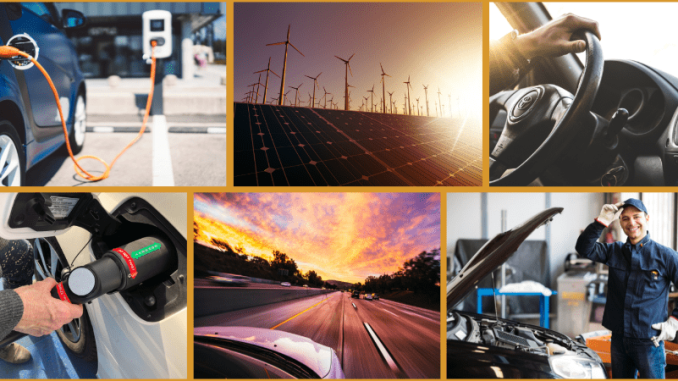
The automotive industry is undergoing a significant transformation to address climate change, recognizing its role as a major contributor to greenhouse gas emissions. The sector is implementing a range of strategies to reduce its environmental impact, and these efforts span technological innovation, regulatory compliance, consumer demand, and broader systemic changes. Here’s a more detailed look at how the automotive industry is addressing climate change:
- Electric Vehicles (EVs):Electric vehicles are at the forefront of the industry’s response to climate change. EVs run on electricity and produce zero tailpipe emissions. Automakers are investing heavily in EV technology, developing numerous models, and expanding charging infrastructure. Companies like Tesla, Nissan, and traditional automakers such as GM, Ford, and Volkswagen are leading this transition.
- Hybrid Vehicles:Hybrid vehicles, which combine internal combustion engines with electric propulsion, offer improved fuel efficiency and reduced emissions. There are different types of hybrids, including traditional hybrids, plug-in hybrids (PHEVs), and mild hybrids. PHEVs can operate in full electric mode for short distances, further reducing emissions.
- Fuel Efficiency Improvements:Automakers are continuously improving the fuel efficiency of internal combustion engine (ICE) vehicles. This includes innovations like turbocharging, direct injection, lightweight materials, and aerodynamic design. These enhancements not only reduce fuel consumption but also lower emissions.
- Alternative Fuels:Beyond electrification, the industry is exploring alternative fuels. Hydrogen fuel cell vehicles, for instance, produce only water vapor as an emission, and they hold promise for long-haul applications. Biofuels made from renewable sources are another avenue for reducing carbon emissions.
- Autonomous Vehicles:Autonomous vehicles have the potential to contribute to climate change mitigation by optimizing traffic flow, reducing congestion, and minimizing energy waste. Autonomous systems can also optimize routes and driving patterns for efficiency.
- Materials and Manufacturing:Sustainability in the automotive industry extends to the manufacturing process. Automakers are using more eco-friendly materials, reducing waste, and adopting energy-efficient manufacturing methods to lower the environmental impact of production.
- Eco-Friendly Design:Designing vehicles with improved aerodynamics and reduced weight enhances fuel efficiency, leading to lower emissions. This includes the use of lightweight materials like aluminum and composites.
- Emissions Standards:Governments worldwide have established stringent emissions standards for vehicles. Compliance with these standards is pushing automakers to produce cleaner, more efficient vehicles. Many governments are promoting electric vehicle adoption and offering incentives to reduce emissions.
- Collaboration and Research:The automotive industry collaborates with governments, academia, and environmental organizations to conduct research and develop technologies for emissions reduction. This collaborative approach has led to advancements in battery technology, alternative fuels, and energy-efficient transportation solutions.
- Consumer Education:The industry is actively working to educate consumers about the environmental benefits of eco-friendly vehicles and the importance of reducing carbon emissions. Public awareness campaigns and marketing efforts are instrumental in promoting green transportation options.
- Charging Infrastructure:A robust charging infrastructure is essential for the widespread adoption of electric vehicles. Many automakers are investing in and collaborating with third-party charging networks to make EVs more accessible and convenient for consumers.
- Circular Economy:Some forward-thinking automakers are exploring the concept of the circular economy, where vehicles are designed for reuse, remanufacturing, and recycling. This approach reduces waste and conserves resources, contributing to sustainability goals.
- Corporate Responsibility:Automakers are increasingly setting ambitious sustainability goals and commitments. Some companies aim to become carbon neutral or significantly reduce their carbon footprint. These goals extend beyond vehicle production to include supply chains and operations.
- Innovative Mobility Solutions:In addition to greener vehicles, the industry is embracing new mobility solutions. Car-sharing, ride-hailing, and micro-mobility options like electric scooters and bicycles are becoming more prevalent. These alternatives can reduce the need for personal vehicle ownership and lower emissions.
- Regulatory Compliance:Governments and regulatory bodies worldwide are tightening emissions standards and implementing policies to accelerate the adoption of low-emission vehicles. This includes carbon pricing mechanisms, emission reduction targets, and incentives for manufacturers to produce cleaner vehicles.
- R&D Investment:Automotive companies are dedicating substantial resources to research and development. They are focusing on battery technology improvements, advanced materials, and sustainable manufacturing processes to create more environmentally friendly vehicles.
- Global Initiatives:International collaborations, such as the Paris Agreement, play a significant role in shaping the automotive industry’s response to climate change. These agreements set global goals for reducing emissions and encourage automakers to align with broader climate action efforts.
- Consumer Demand:Consumer preferences are shifting toward more eco-friendly options. As people become more conscious of environmental concerns, automakers are responding by offering a wider range of sustainable vehicle choices to meet this demand.
- Urban Planning and Infrastructure:Many cities are promoting sustainable transportation by investing in public transit, cycling infrastructure, and pedestrian-friendly urban planning. This approach reduces the need for personal vehicles and promotes greener modes of transportation.
- Supply Chain Sustainability:The automotive industry is increasingly scrutinizing its supply chain for environmental sustainability. This includes responsible sourcing of raw materials, reducing the carbon footprint of the supply chain, and ensuring ethical and sustainable practices.
The automotive industry’s efforts to address climate change are multifaceted, encompassing vehicle technology, environmental sustainability in manufacturing, and a commitment to corporate social responsibility. While substantial progress has been made, ongoing innovation, policy support, and widespread consumer adoption of sustainable transportation options will be critical in achieving a more environmentally friendly and sustainable future for the industry.

Leave a Reply